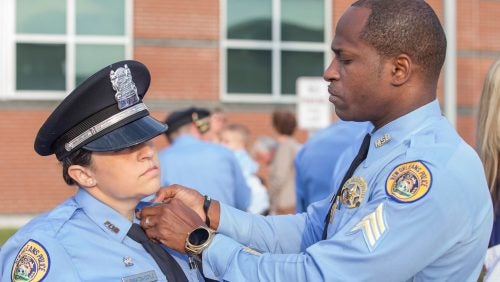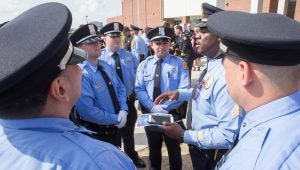Georgetown Law’s Innovative Policing Program Launches Project ABLE to Help Police Departments Build a Culture of Active Bystandership
July 8, 2020

A New Orleans police officer affixes a pin to an officer's uniform after completing peer intervention training.
Four years ago, the Minneapolis Police Department added a “duty to intervene” policy to the books. But when Officer Derek Chauvin planted his knee on George Floyd’s neck for nearly nine minutes, three other officers did nothing to stop him.
In the wake of Floyd’s killing and nationwide protests, several police departments have adopted policies requiring officers to step in if another officer uses inappropriate force. Meanwhile, Minneapolis and other departments have strengthened existing mandates.
But policies alone are not enough to save lives in the real world, says Georgetown Law Professor from Practice Christy Lopez.
“What we know is that people do not always intervene when they should, and they may spend the rest of their lives regretting it,” Lopez said. “If you want police to intervene, you have to teach them how and you have to create a culture that supports intervention.”
Georgetown Law’s Innovative Policing Program, co-directed by Lopez, is now launching a national project to do just that.
Project ABLE
Project ABLE (Active Bystandership for Law Enforcement) will support law enforcement agencies across the country in building a successful culture of peer intervention, also known as active bystandership. The Project, in partnership with the international law firm Sheppard Mullin, will provide resources, including practical scenario-based training in peer intervention strategies and tactics.

Christy Lopez
“Training in active bystandership is an important part of rethinking public safety,” Lopez said. “Even if we entirely redefine policing, we will need first responders and people to mediate disputes. Those people will need to know how to intervene to prevent harm.”
A virtual open house on July 15 will provide interested police departments with more information. Project ABLE’s first virtual “train the trainer” event will kick off in September.
Under the Innovative Policing Program, Georgetown Law faculty already offer workshops for Washington D.C.’s Metropolitan Police Department through the Police for Tomorrow Fellowship on topics such as use of force, institutionalized racism in the justice system, and mass incarceration.
Though peer intervention has been incorporated into some police training programs, there is no coordinated effort nationwide. Project ABLE was created to fill that gap. It will be free for law enforcement agencies, but they must commit to creating a culture of peer intervention with support and accountability – from the top brass to the rank and file.
“The easy bit for law enforcement agencies is making sure they have a policy requiring intervention,” Lopez said. “The more complicated bit is implementing practices that demonstrate that this culture [of peer intervention] is actually influencing behavior in the department.”
Empowering Bystanders to Act
The concept of peer intervention is founded on psychologist Ervin Staub’s seminal studies on “active bystandership.” Staub, a Hungarian Jew, survived the Nazi occupation of Budapest thanks to a Swedish diplomat who provided him and his family with a safe place to live. The experience led to a life-long inquiry into genocide and why some people intervene when they see wrong-doing while others don’t.
Staub’s research has informed campaigns that focus on empowering bystanders – from the classic slogan “Friends Don’t Let Friends Drive Drunk” popularized in the 1980s to the more recent Green Dot program, which fosters a culture of peer intervention on college campuses to prevent sexual violence. His work is woven into airlines’ training programs that teach copilots to intervene if they think a pilot is making a mistake in the cockpit.
In New Orleans, longtime civil rights attorney Mary Howell brought the research on active bystandership to Lopez’s attention while she was leading a federal investigation into unconstitutional policing practices there. Lopez, then deputy chief of the U.S. Department of Justice’s Civil Rights Division, was impressed and wrote peer intervention training into the requirements of New Orleans Police Department’s federal consent decree, or court-enforceable reform agreement.
That set the NOPD on a path to develop an active bystandership program known as EPIC (Ethical Policing is Courageous), which has become the national standard for teaching police peer intervention. Its curriculum will be the basis for Project ABLE.

Jonathan Aronie
The training starts with recognizing the factors that contribute to passive bystandership – from fear of retaliation to the inhibiting influence passive bystanders can exert on each other. Just like any other behavior change, it takes practice for officers to develop a muscle memory for stepping in when they see misconduct.
“While every police officer has learned to do a use of force in the academy, almost none has had to practice an intervention,” said Jonathan Aronie, chair of the Board of Advisors for ABLE and a partner at Sheppard Mullin. “They’ve never even had to visualize an intervention because we all tell ourselves, ‘Of course, we would do the right thing.’”
Interventions can take many forms: a subtle verbal cue, a tap on the shoulder, or one officer telling another “I’ll take it from here” when tempers flare.
Redefining Loyalty
 Given the focus on prevention, it is difficult to assess EPIC’s direct impact in New Orleans. According to a January 2019 consent decree assessment, the NOPD saw a drop in use of force incidents, citizen complaints and lawsuits. Importantly, EPIC was embedded in a set of sweeping departmental changes.
Given the focus on prevention, it is difficult to assess EPIC’s direct impact in New Orleans. According to a January 2019 consent decree assessment, the NOPD saw a drop in use of force incidents, citizen complaints and lawsuits. Importantly, EPIC was embedded in a set of sweeping departmental changes.
The program shifted definitions of loyalty “so if you don’t intervene you’ve let your fellow officers down,” said Howell, the New Orleans civil rights lawyer.
Project ABLE will take lessons learned in New Orleans to a national audience.
“ABLE is really important on many levels,” Howell said. “The NOPD has done a lot of work on [peer intervention], but New Orleans is a relatively small city and police department. The question of taking this to the next level is significant.”
“This really has the capacity to save lives, to reduce harm, to prevent terrible incidents from happening such as the ones we’ve been witnessing,” she added.
“The First Step in Culture Change”
Several agencies are moving toward adopting peer intervention training. The Baltimore Police Department is currently working to roll out an active bystandership program as part of a consent decree following the 2015 death of Freddy Gray from injuries sustained in custody.
Baltimore Police Commissioner Michael Harrison, who led the New Orleans police department from 2014 to 2019, said peer intervention “should be about transforming the department to build trust with the community. It’s the first step in culture change.”
“We’ve spent a lot of time talking about de-escalation of citizens’ behavior,” Harrison added. “This teaches us to deescalate each other’s behavior. That’s a big cultural shift.”
At a time of unprecedented protests for racial justice, veteran New Orleans civil rights activist Ted Quant said he hopes police departments adopt peer intervention as part of their broader reforms.
“I’ve never been in a moment like this,” Quant said. “That knee on George’s neck, it was a moral deal breaker for people who never thought they would be marching against police brutality in this way.”
“There has to be commitment and real desire for change,” Quant added. “I see ABLE can be part of that.”